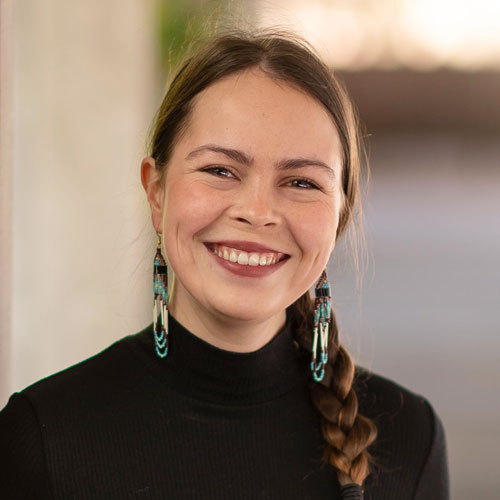Program: Northern Medical Program
Growing up, I knew I wanted a job where I could travel, work with people, and have the potential to create positive change in my community. In high school, I first thought that I would do a literature and political science degree and go into journalism (my dream job was the reporter from the movie Blood Diamond). Around that time, I started volunteering at the hospital in Prince George and became interested in the world of healthcare. I realized that with a degree in medicine, I could also work in different communities and influence change.
During my undergraduate degree, I learned about the history and current realities of Indigenous Peoples and colonization, the ongoing effects on health and wellness, and about my own identity as a white-presenting mixed heritage Indigenous person (I am Anishinaabe through my mother’s side and my grandfather came from the area around Kenora, Ontario, but grew up on Lheidli T’enneh territory in Prince George). The emotions I experienced going through this learning process helped me realize that I wanted to serve Indigenous communities, be an advocate to influence healthcare and policy, and become a rural family physician.
I have many fond memories from medical school, including living with an amazing group of girls in Vancouver during my first year, bonding with my northern classmates during boot camp and trivia night, and finding three lifelong friends during my Integrated Community Clerkship in Fort St. John. That said, one of the best things about being at the NMP was having the opportunity to work with Dr. Nadine Caron, one of my mentors. Through her, I discovered and attended a public health institute at Johns Hopkins University and completed the UBC Centre for Excellence in Indigenous Health’s Graduate Certificate in Indigenous Public Health – which was launched by Dr. Caron and an amazing team at the School of Population and Public Health. These were life-changing events that shaped my personal and professional identity and provided me with an incredible group of mentors and peers. I can honestly say that I wouldn’t be the person I am now without these experiences.
Never give up on the passions and convictions that drove you to apply to medical school in the first place. Medical school can be tough and demanding – from hours spent over books during pre-clinical years to the days and nights spent at the hospital during clerkship. I did have some moments through medical school where I felt like medicine might not be for me because I could not picture myself doing the work some people around me were doing. But by connecting with doctors, residents, and students with a similar worldview, I realized it was possible to do the work in a way that felt right for me. On those tough days, remember to be true to yourself and seek out like-minded peers and mentors that keep you feeling inspired. Having that support network to listen to you and inspire you to keep going will be instrumental to your success.
Something that always brings me joy is being outdoors and connecting with nature. Whether it is hiking, kayaking, riding my mountain bike, bird watching, or sitting in a garden, I need to spend time outdoors each day to keep me sane.
I’ll be moving to Vancouver to start my residency in the Indigenous Family Medicine Program. I am so excited to be starting this next part of my journey and hope to return to Northern B.C. as often as possible during residency for outreach clinics to First Nations communities. After residency, my plan is to start practicing with a focus in addictions, maternity care, reproductive and sexual health, and rural outreach. I am also considering doing extra training in obstetrics and surgical skills to provide C-sections in smaller communities.
